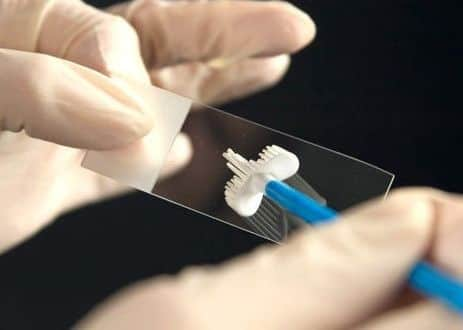Women urged to go for smear tests - '˜they could save your life'


That is the stark message from women and health professionals across the Portsmouth area in Cervical Cancer Awareness Week.
Figures show women in Portsmouth are still less likely than those across the rest of the country to attend their screenings, known as smear tests, and calls are being made to see this number increase.
Advertisement
Hide AdAdvertisement
Hide AdWomen aged 25 to 49 are invited for a screening every three years, while 50 to 64-year-olds are asked every five years.


Emma Duke, from Stamshaw, knows only too well how crucial the screenings are.
She was diagnosed with cervical cancer aged 32 after missing a smear test which she believes could have prevented the cancer.
As with all women aged over 25, Emma was invited for the test in December, 2013 but it was not until seven months later that she decided to have one.
Advertisement
Hide AdAdvertisement
Hide AdShe was then told the devastating news that she had cervical cancer.


The 35-year-old is now in remission and has check-ups every three months.
Emma uses her own experience to encourage other women to have the smear test and her message is simple: ‘It will save your life’.
She says: ‘If I hadn’t gone for the test then I don’t think I would be here today.
‘It will save your life – that is the most important thing.
Advertisement
Hide AdAdvertisement
Hide Ad‘It is uncomfortable for a few minutes but if it prevents you getting cervical cancer, then it’s saved your life.
‘It’s so important that women go along.’
Figures from charity Jo’s Cervical Cancer Trust show that only 68 per cent of women in Portsmouth attended their smear test. This is lower than previous years.
Nationally, the average has also dropped and now stands at 72 per cent. The target is for 80 per cent of women to be screened.
Emma says being scared is the only way she can explain why women are not going along.
Advertisement
Hide AdAdvertisement
Hide Ad‘I do think there is a fear among women because it’s not nice,’ she adds.
‘I can’t think of anything else which would be stopping women from having the test.
‘But I try to tell my friends about what it’s like and to encourage them.
‘When I was diagnosed I didn’t know anything about cervical cancer, but I use my story to help other women.
Advertisement
Hide AdAdvertisement
Hide Ad‘I openly talk to my friends about it all and I would rather talk about it and get them to go take the test.’
As part of Cervical Cancer Awareness Week, Jo’s Cervical Cancer Trust has been encouraging people to take part in the #SmearForSmear social media campaign.
Women have been applying lipstick and then smearing it before taking a selfie and posting it on Twitter and Facebook.
Hundreds of women have taken part already.
Robert Music, chief executive of the charity, says: ‘The number of women in England attending smear tests is at a 19-year low and the number of women being diagnosed is worryingly high.
‘We simply cannot afford for this to continue.
Advertisement
Hide AdAdvertisement
Hide Ad‘Smear tests prevent 75 per cent of cervical cancers and provide the best protection against the disease.
‘I would encourage every woman to attend their smear test when invited.’
For more information on cervical cancer and the work of Jo’s Trust, visit jostrust.org.uk.
WHAT IS A SMEAR TEST?
Sometimes called a smear test, a cervical screening test is a method of detecting abnormal cells on the cervix.
Advertisement
Hide AdAdvertisement
Hide AdWhile the test is not a direct cancer screening, what it does is check the health of the cells of the cervix.
If abnormalities are detected, cells can be removed to stop them becoming cancerous.
The aim of the NHS Cervical Screening Programme is to reduce the number of women who develop cervical cancer and the number of women who then die from the condition.
Women aged between 25 and 49 are invited for testing every three years, and women aged between 50 and 64 are invited every five years.
CONSULTANTS ADD THEIR SUPPORT
Advertisement
Hide AdAdvertisement
Hide AdHospital consultants are throwing their support behind Cervical Cancer Awareness Week.
Doctors at Queen Alexandra Hospital, in Cosham, and Spire Portsmouth Hospital, in Havant, are urging women to go for their smear tests.
Consultant gynaecologist Dirk Brinkmann says: ‘Cervical cancer is a preventable disease.
‘The signs that it may develop can often be spotted very early on and treated. The single biggest risk factor for developing cervical cancer is not being regularly screened.’
He adds: ‘The routine of attending a cervical screening should be an important part of every woman’s health regime.’